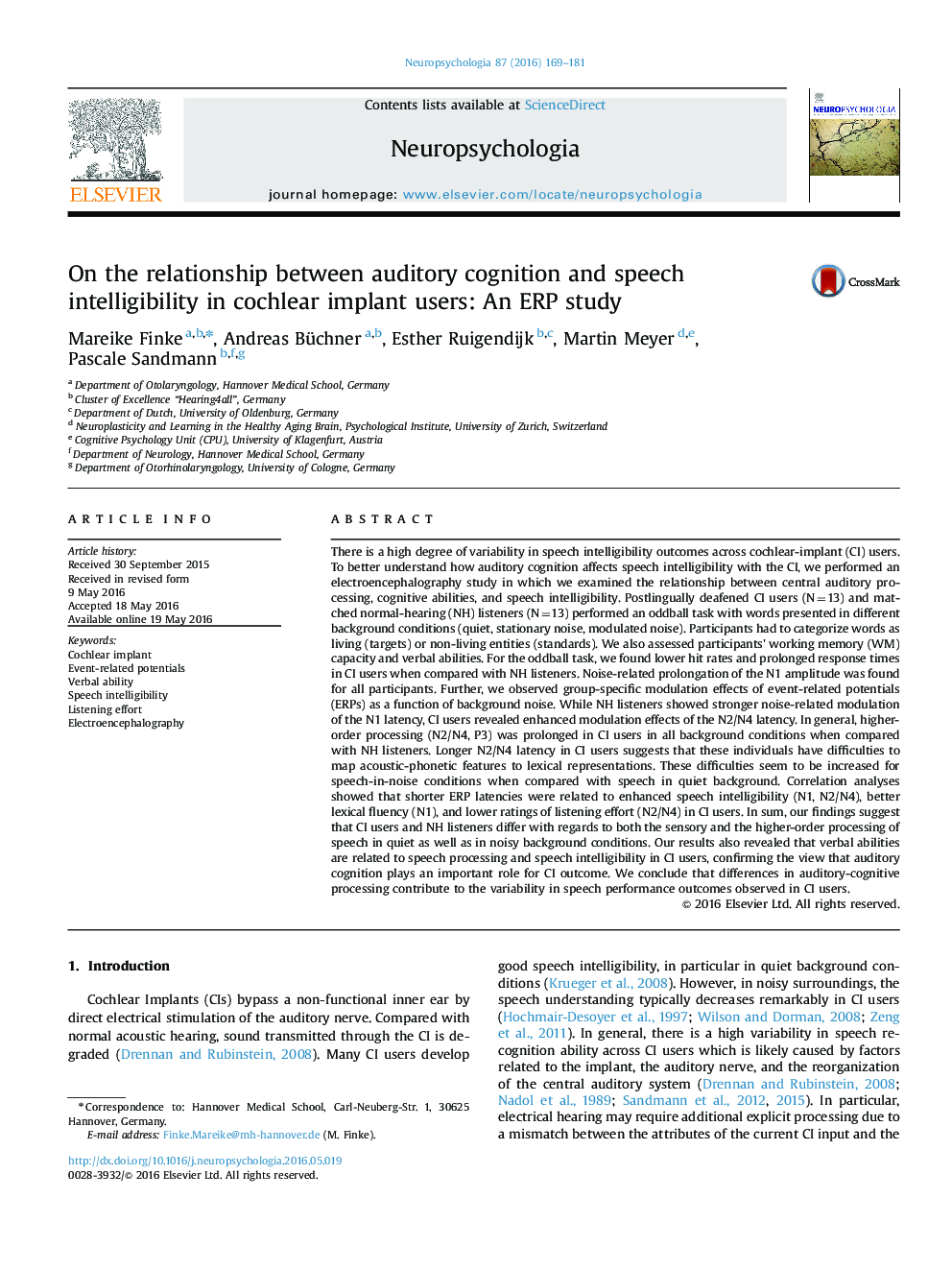| کد مقاله | کد نشریه | سال انتشار | مقاله انگلیسی | نسخه تمام متن |
|---|---|---|---|---|
| 7319008 | 1475567 | 2016 | 13 صفحه PDF | دانلود رایگان |
عنوان انگلیسی مقاله ISI
On the relationship between auditory cognition and speech intelligibility in cochlear implant users: An ERP study
دانلود مقاله + سفارش ترجمه
دانلود مقاله ISI انگلیسی
رایگان برای ایرانیان
کلمات کلیدی
موضوعات مرتبط
علوم زیستی و بیوفناوری
علم عصب شناسی
علوم اعصاب رفتاری
پیش نمایش صفحه اول مقاله

چکیده انگلیسی
There is a high degree of variability in speech intelligibility outcomes across cochlear-implant (CI) users. To better understand how auditory cognition affects speech intelligibility with the CI, we performed an electroencephalography study in which we examined the relationship between central auditory processing, cognitive abilities, and speech intelligibility. Postlingually deafened CI users (N=13) and matched normal-hearing (NH) listeners (N=13) performed an oddball task with words presented in different background conditions (quiet, stationary noise, modulated noise). Participants had to categorize words as living (targets) or non-living entities (standards). We also assessed participants' working memory (WM) capacity and verbal abilities. For the oddball task, we found lower hit rates and prolonged response times in CI users when compared with NH listeners. Noise-related prolongation of the N1 amplitude was found for all participants. Further, we observed group-specific modulation effects of event-related potentials (ERPs) as a function of background noise. While NH listeners showed stronger noise-related modulation of the N1 latency, CI users revealed enhanced modulation effects of the N2/N4 latency. In general, higher-order processing (N2/N4, P3) was prolonged in CI users in all background conditions when compared with NH listeners. Longer N2/N4 latency in CI users suggests that these individuals have difficulties to map acoustic-phonetic features to lexical representations. These difficulties seem to be increased for speech-in-noise conditions when compared with speech in quiet background. Correlation analyses showed that shorter ERP latencies were related to enhanced speech intelligibility (N1, N2/N4), better lexical fluency (N1), and lower ratings of listening effort (N2/N4) in CI users. In sum, our findings suggest that CI users and NH listeners differ with regards to both the sensory and the higher-order processing of speech in quiet as well as in noisy background conditions. Our results also revealed that verbal abilities are related to speech processing and speech intelligibility in CI users, confirming the view that auditory cognition plays an important role for CI outcome. We conclude that differences in auditory-cognitive processing contribute to the variability in speech performance outcomes observed in CI users.
ناشر
Database: Elsevier - ScienceDirect (ساینس دایرکت)
Journal: Neuropsychologia - Volume 87, 1 July 2016, Pages 169-181
Journal: Neuropsychologia - Volume 87, 1 July 2016, Pages 169-181
نویسندگان
Mareike Finke, Andreas Büchner, Esther Ruigendijk, Martin Meyer, Pascale Sandmann,